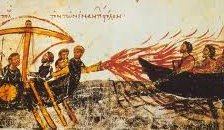Pontifex Maximus
Gratian was fanatically Christian and played an important role in the final prevalence of Christianity. In 382, at the urging of Saint Ambrose, he removed the Altar of Victory from the Forum and withdrew state funding for pagan activities. When the Senate protested, Gratian rejected the honorary title of pontifex maximus and the ceremonial robes that went with this office. This incident prompted a senator to prophesy that there would be inevitably a new pontifex maximus. The killing of Gratian by the usurper Magnus Maximus was seen as a fulfillment of the prophesy.
-
A Vandal Prophecy
In 431/434, while the unknown, middle-rank officer Marcian was participating in a military campaign in Africa, he was taken prisoner by the Vandals. Marcian was brought before King Geiseric (428–477), who knew by a prophecy that Marcian was to be emperor and released him on his oath never to take up arms against the Vandals. Marcian must have been amused, but he became emperor 20 years later.
The coming of the circumcised man
Islamic sources record that Heraclius saw in a dream that a new kingdom of the "circumcised man" will be victorious against all its enemies. When he discussed the dream in his court, his patricians, who did not have a clue about the rising Islam in Arabia, "advised him to send orders to behead every Jew in his dominion."(!!!)
Only when a Bedouin trader spoke to the emperor of a man uniting the tribes of Arabia under a new religion, did Heraclius and his court realize that the kingdom of the "circumcised man" was not the Jews but the Arabs.Bad dream
Before the his landmark defeat in the sea battle of the Mast (655), emperor Constans II dreamed of being at Thessaloniki.
The dream interpreters explained (maybe after the battle) that the dream predicted his defeat by the Arabs because the word "Thessaloniki" is similar to the sentence "thes allo niki", that means "you want another victory" (a little far-fetched).
The Oracles of Leo the Wise
Leo VI the Wise (886-912), was considered an authority in witchcraft and astrology. Succeeding generations saw him as a prophet. A collection of oracular verses, the so-called Oracles of Leo the Wise, based in part on earlier Greek sources, were in circulation at least since 1200, under the emperor's name.
The oracles foretell the future of the world and the fate of the Greek Empire for many hundreds of years. They were also the source for the famous prophecies of Pseudo-Joachim of Fiore about future Popes.
The most remarkable oracle was the prediction that Constantinople would be liberated 320 years after its fall (i.e. 1773. It didn't happen...).Short reign
Alexander (912-913), died 13 months after his ascension to the throne (after a polo match, possibly of a heart attack ). When he died, the Byzantines remembered that an oracle of his brother, Leo VI, predicted that Alexander would reign for 13 months only.
Bloody prophesy
The AIMA prophecy was a prophecy which was taken very seriously during the reign of the Byzantine emperor, Manuel I Komnenos (1143-1180).
According to it, the initial letters of the names of the emperors of the Komnenid dynasty would spell "aima" (αιμα), the Greek word for blood.
The emperors had been, in order, Alexius I , Ioannes (John) II, and Manuel I (whose succession was unexpected, being the fourth son of Ioannes).
Because of his belief that his successor's name would have to start with "alpha", Manuel had the name Alexius bestowed on his daughter first fiancé and on at least one of his illegitimate sons, and finally on his legitimate son Alexius, child of his second marriage.
The reign of Alexius II lasted only three years. He was deposed and killed by his cousin, Andronicos I Komnenos, with whom, apparently, the AIMA sequence began again. According to the prophecy, Andronicos would be succeeded in turn by an emperor whose initial would be the letter I (iota). Hence, he was afraid of another cousin, Isaac Komnenos of Cyprus. In fact, Andronicos was killed in 1185 and succeeded by Isaac II Angelus...
|

